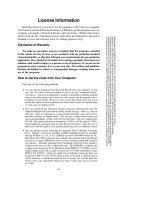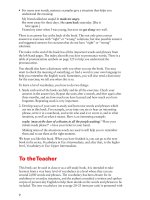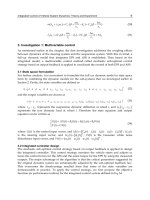ADJECTIVES USED IN COMPARISONS: PART 2
Bạn đang xem bản rút gọn của tài liệu. Xem và tải ngay bản đầy đủ của tài liệu tại đây (91.4 KB, 10 trang )
1. For each of the following sentences, fill in the blank with the comparative form of
the adjective indicated in brackets. For example:
They are ___________ than they used to be. (careful)
They are more careful than they used to be.
1. Wool is _______________ than cotton. (resilient)
2. He is _______________ than I had expected. (excited)
3. She is a _______________ scholar than her sister is. (diligent)
4. Bev is a __________________ engineer than Pat. (experienced)
5. Russian is a _______________ language to learn than English is. (difficult)
6. This book is _______________ than that one. (interesting)
Answers
2. Paying attention to which adjectives form the comparative with the
adverb more and which form the comparative with the ending er, fill in the blanks
with the comparative forms of the adjectives indicated in brackets. For example:
The clothes are _____ than I had expected. (dry)
The clothes are drier than I had expected.
Walter Scott is __________ than Walter Brooks. (famous)
Walter Scott is more famous than Walter Brooks.
1. The pears are _______________ than the plums. (hard)
2. The roses are ______________ than the nasturtiums. (beautiful)
3. The tomatoes are _______________ than the apples. (expensive)
4. My bicycle is _______________ than yours. (new)
5. Cold lemonade is _______________ than water. (refreshing)
6. The front yard is _______________ than the back yard. (big)
7. This map is _______________ than that one. (good)
8. Spinach is ______________ than Swiss chard. (delicate)
9. His room is _______________ than yours. (tidy)
10. Her report is _______________ than ours. (accurate)
Answers
3. Paying attention to which adjectives form the comparative with the
adverb more and which form the comparative with the ending er, rewrite the
following sentences as comparisons, in the manner indicated by the examples. Use the
words given in brackets as the second parts of the comparisons. For example:
Collies have long hair. (dalmations do)
Collies have longer hair than dalmations do.
He is an experienced architect. (we thought)
He is a more experienced architect than we thought.
1. Terry is a good cook. (I am)
2. That is a complex question. (you realize)
3. My puppy has big feet. (yours does)
4. It was a difficult decision. (you might think)
5. That is a sandy part of the beach. (this is)
6. He runs a successful business. (his father did)
7. Cliff has a bad temper. (his brother does)
8. This rose bush has small flowers. (that one does)
9. They own expensive bicycles. (we do)
10. Robin proved to be a courageous leader. (anyone had expected)
11. The school has a large auditorium. (the city library does)
12. That car has an efficient engine. (this one does)
Answers
4. Paying attention to which adjectives form the comparative with the ending er and
which form the comparative with the adverb more, rewrite each of the following
sentences, using the construction in which the word more or the comparative form of
the adjective is repeated. For example:
The water grew increasingly warm.
The water grew warmer and warmer.
I became increasingly impatient.
I became more and more impatient.
1. The rain became increasingly heavy.
2. The crowd grew increasingly enthusiastic.
3. We became increasingly uneasy.
4. Manufacturing companies were becoming increasingly large.
5. The weather grew increasingly bad.
6. The compilation of accurate statistics is becoming increasingly necessary.
7. Methods of diagnosis are becoming increasingly accurate.
8. Their contribution to the project became increasingly important.
9. Standards are becoming increasingly high.
10. They became increasingly optimistic.
Answers
5. Rewrite each of the following sentences as comparisons, using the form of the
adjective with less and the word than. For each sentence, use the words given in
brackets as the second part of the comparison. For example:
The plot of the movie was predictable. (we expected)
The plot of the movie was less predictable than we expected.
The second explanation was confusing. (the first)
The second explanation was less confusing than the first.
1. The issue is important. (I thought)
2. The train is punctual. (it used to be)
3. The spoons are valuable. (the candlesticks)
4. Nora is excited. (Karen is)
5. The bus is crowded. (the subway)
6. This movie is entertaining. (the one we saw last night)
Answers
6. Rewrite each of the following sentences, using the construction in which the
word less is repeated. For example:
The idea became decreasingly attractive.
The idea became less and less attractive.
1. The wind grew decreasingly fierce.
2. The tune became decreasingly recognizable.
3. Word processors are becoming decreasingly expensive.
4. The rainbow grew decreasingly bright.
5. The children became decreasingly alert.
6. The service became decreasingly convenient.
Answers
7. Paying attention to which adjectives form the superlative with the adverb most and
which form the superlative with the ending est, fill in the blanks with the superlative
forms of the adjectives indicated in brackets. For example:
The first question is the ______________. (difficult)
The first question is the most difficult.
The last question is the _______. (easy)
The last question is the easiest.
1. Sarah is the ________________ girl in the class. (intelligent)
2. He is the _______________ boy in the school. (lucky)
3. This is the _________________ book I have ever read. (good)
4. That is the _________________ painting in the museum. (valuable)
5. Yesterday was the ________________ day of the year. (hot)
6. She is the _______________ student in the school. (new)
7. This movie is the _________________. (entertaining)
8. He is the _______________ man in the village. (brave)
9. Summer is usually the _________________ time of the year. (dry)
10. He is the _________________ player on the team. (talented)
11. This is the ________________ route into town. (direct)
12. The library is the _________________ building on the street. (old)
Answers
8. Paying attention to whether the noun to be modified is countable or uncountable,
complete each of the following sentences by filling in the blank with the correct
adjective chosen from the pair given in brackets. For example:
____ schools were closed because of the snowstorm. (many, much)
Many schools were closed because of the snowstorm.
____ time could have been saved. (many, much)
Much time could have been saved.
There are ___ buildings as beautiful as the Taj Mahal. (few, little)
There are few buildings as beautiful as the Taj Mahal.
There was ______ furniture in the room. (few, little)
There was little furniture in the room.
The storm caused ____ damage than had been expected. (fewer, less)
The storm caused less damage than had been expected.
1. There are __________ ducks in the park. (many, much)
2. __________ water is left in the pond. (few, little)
3. __________ authors are as famous as Shakespeare. (few, little)
4. How __________ rice do you have? (many, much)
5. There are __________ books on the subject which she has not read. (few, little)
6. __________ attention has been paid to the importance of the mass media. (many,
much)
7. _________ people prefer soccer to football. (many, much)
8. There are ___________ stores downtown than there are in the suburbs. (fewer, less)
9. __________ information was available. (few, little)
10. _________ sports are as fast-paced as hockey. (few, little)
11. She made the ____________ mistakes of all the children in the class. (fewest,
least)
12. __________ work remains to be done. (few, little)
13. There is often __________ wind in the evening than there is at midday. (fewer,
less)
14. He does not have _________ money. (many, much)
15. He did the __________ work of all the boys in the class. (fewest, least)
16. She told __________ stories to amuse the children. (many, much)
Answers
9. The following table shows the number of books and amount of money possessed by
each of eight children.
Child's Name Number of Books Amount of Money ($)
Debbie 12 20
Penny 6 30
Alex 4 10
Tim 24 5
Chris 8 2
Lisa 3 15
Terry 16 6
Helen 2 3
Following the model of the examples, use the adjectives much and many to write
sentences comparing the number of books or the amount of money possessed by the
children in each of the following pairs. For example:
Debbie and Penny (books)
Debbie has twice as many books as Penny.
Alex and Debbie (money)
Alex has half as much money as Debbie.
Lisa and Helen (money)
Lisa has five times as much money as Helen.
1. Penny and Alex (money)
2. Chris and Terry (books)
3. Penny and Lisa (books)
4. Debbie and Tim (money)
5. Tim and Alex (money)
6. Penny and Tim (books)
7. Terry and Helen (money)
8. Terry and Helen (books)
9. Tim and Chris (books)
10. Penny and Tim (money)
Answers
10. Rewrite each of the following sentences as a comparison, using the comparative
form of the underlined adjective, and the word than. Note that the phrase a great deal
of is used instead of the adjective much. For each sentence, use the word or words
given in brackets as the second part of the comparison. For example:
We took many photographs. (he did)
We took more photographs than he did.
He drinks a great deal of coffee. (tea)
He drinks more coffee than tea.
She has few responsibilities. (I do)
She has fewer responsibilities than I do.
There is little danger. (you think)
There is less danger than you think.
1. She reads many books. (I do)
2. They have had little success. (you have)
3. We bought a great deal of rice. (flour)
4. We had few accidents, we had expected)
5. The proposal has many advantages. (disadvantages)
6. She uses a great deal of honey. (sugar)
7. We eat little cheese. (meat)
8. They entertain few visitors. (we do)
9. He can speak many languages. (anyone else I know)
10. They have few customers. (they would like)
11. The project will take a great deal of time. (you think)
12. This stove requires little fuel. (one would expect)
Answers
11. Rewrite each of the following sentences as a progressive comparison using the
comparative form of the underlined adjective. For example:
Many ducks flew overhead.
More and more ducks flew overhead.
Few leaves were falling.
Fewer and fewer leaves were falling.
1. We had many adventures.
2. Few visitors remained.
3. There was little danger that we would lose our way.
4. Few trees were planted.
5. Many tourists visit our city each year.
6. I saw few cars on the road.
7. The weather caused little difficulty.
8. They met many people.
Answers
12. Write three sentences of your own, using the phrases similar to, different
from and the same as.
13. Rewrite each of the following sentences, keeping the meaning of the sentence, but
using one of the phrases similar to, different from or the same as, as appropriate.
Make sure that the verb of the rewritten sentence agrees with the subject of the
sentence. For example:
My essay and your essay are similar.
My essay is similar to your essay.
Their results and our results are different.
Their results are different from our results.
The price of the scarf and the price of the gloves are the same.
The price of the scarf is the same as the price of the gloves.
1. My skates and his skates look similar.
2. This book and that book are different.
3. The child's height and the height of the table are the same.
4. This story and that story seem similar.
5. The date of the concert and the date of the play are the same.
6. The view from the window and the view from the door are different.
7. My sister and my cousin look similar.
8. This cake and that cake taste the same.
9. My experiences and your experiences are different.
10. His schedule and your schedule are the same.
Answers
14. Each of the following sentences contains a comparison which is logically
incorrect. Rewrite the sentences, adding whatever nouns or phrases are necessary in
order to make the comparisons logically correct. For example:
The price of honey was higher than sugar.
The price of honey was higher than the price of sugar.
The average rainfall for September is the same as February.
The average rainfall for September is the same as the average rainfall for
February.
1. The vegetation of Europe differs from North America.
2. The taxes in Singapore are lower than Canada.
3. The invention of the clarinet occurred more recently than the flute.
4. The speed limit in residential areas is lower than uninhabited areas.
5. The grammar of English is simpler than Arabic.
6. The climate of California is somewhat similar to Greece.
7. The boiling point of oil is higher than water.
8. The geometry of a pentagon is more complex than a square.
9. The density of water is greater than ice.
10. The location of the library is more convenient than the post office.
Answers
15. Simplify each of the following sentences by using that or those to replace the
noun or phrase which is repeated in the second part of the comparison. For example:
The song of the chickadee is more melodious than the song of the nuthatch.
The song of the chickadee is more melodious than that of the nuthatch.
The landforms of eastern Canada are similar to the landforms of Finland.
The landforms of eastern Canada are similar to those of Finland.
1. The cuisine of France is more famous than the cuisine of England.
2. The fruits of the tropics are more varied than the fruits of temperate regions.
3. The growth form of the strawberry differs from the growth form of the raspberry.
4. The freezing point of salt water is lower than the freezing point of fresh water.
5. The traditions of Austria are as fascinating as the traditions of Greece.
6. The nutritional value of whole grain flour is greater than the nutritional value of
refined flour.
7. The mountains of Nepal are higher than the mountains of Europe.
8. The teaching methods of today differ from the teaching methods of one hundred
years ago.
9. The tone of an old violin is often more beautiful than the tone of a new violin.
10. The flowers of alpine pastures are more colorful than the flowers of the lowlands.
Answers
ANSWERS TO THE EXERCISES for Chapter 23
Answers to Exercise 1:
1. more resilient 2. more excited 3. more diligent 4. more experienced 5. more
difficult 6. more interesting
Answers to Exercise 2:
1. harder 2. more beautiful 3. more expensive 4. newer 5. more refreshing 6. bigger 7.
better 8. more delicate 9. tidier 10. more accurate
Answers to Exercise 3:
1. Terry is a better cook than I am. 2. That is a more complex question than you
realize. 3. My puppy has bigger feet than yours does. 4. It was a more difficult
decision than you might think. 5. That is a sandier part of the beach than this is. 6. He
runs a more successful business than his father did. 7. Cliff has a worse temper than
his brother does. 8. This rose bush has smaller flowers than that one does. 9. They
own more expensive bicycles than we do. 10. Robin proved to be a more courageous
leader than anyone had expected. 11. The school has a larger auditorium than the city
library does. 12. That car has a more efficient engine than this one does.
Answers to Exercise 4:
1. The rain became heavier and heavier. 2. The crowd grew more and more
enthusiastic. 3. We became more and more uneasy. 4. Manufacturing companies were
becoming larger and larger. 5. The weather grew worse and worse. 6. The compilation
of accurate statistics is becoming more and more necessary. 7. Methods of diagnosis
are becoming more and more accurate. 8. Their contribution to the project became
more and more important. 9. Standards are becoming higher and higher. 10. They
became more and more optimistic.
Answers to Exercise 5:
1. The issue is less important than I thought. 2. The train is less punctual than it used
to be. 3. The spoons are less valuable than the candlesticks. 4. Nora is less excited
than Karen is. 5. The bus is less crowded than the subway. 6. This movie is less
entertaining than the one we saw last night.
Answers to Exercise 6:
1. The wind grew less and less fierce. 2. The tune became less and less recognizable.
3. Word processors are becoming less and less expensive. 4. The rainbow grew less
and less bright. 5. The children became less and less alert. 6. The service became less
and less convenient.
Answers to Exercise 7:
1. most intelligent 2. luckiest 3. best 4. most valuable 5. hottest 6. newest 7. most
entertaining 8. bravest 9. driest 10. most talented 11. most direct 12. oldest
Answers to Exercise 8:
1. many 2. Little 3. Few 4. much 5. few 6. Much 7. Many 8. fewer 9. Little 10. Few
11. fewest 12. Little 13. less 14. much 15. least 16. many
Answers to Exercise 9:
1. Penny has three times as much money as Alex. 2. Chris has half as many books as
Terry. 3. Penny has twice as many books as Lisa. 4. Debbie has four times as much
money as Tim. 5. Tim has half as much money as Alex. 6. Penny has one-quarter as
many books as Tim. 7. Terry has twice as much money as Helen. 8. Terry has eight
times as many books as Helen. 9. Tim has three times as many books as Chris. 10.
Penny has six times as much money as Tim.
Answers to Exercise 10:
1. She reads more books than I do. 2. They have had less success than you have. 3.
We bought more rice than flour. 4. We had fewer accidents than we had expected. 5.
The proposal has more advantages than disadvantages. 6. She uses more honey than
sugar. 7. We eat less cheese than meat. 8. They entertain fewer visitors than we do. 9.
He can speak more languages than anyone else I know. 10. They have fewer
customers than they would like. 11. The project will take more time than you think.
12. This stove requires less fuel than one would expect.
Answers to Exercise 11:
1. We had more and more adventures. 2. Fewer and fewer visitors remained. 3. There
was less and less danger that we would lose our way. 4. Fewer and fewer trees were
planted. 5. More and more tourists visit our city each year. 6. I saw fewer and fewer
cars on the road. 7. The weather caused us less and less difficulty. 8. They met more
and more people.
Answers to Exercise 13:
1. My skates look similar to his skates. 2. This book is different from that book. 3. The
child's height is the same as the height of the table. 4. This story seems similar to that
story. 5. The date of the concert is the same as the date of the play. 6. The view from
the window is different from the view from the door. 7. My sister looks similar to my
cousin. 8. This cake tastes the same as that cake. 9. My experiences are different from
your experiences. 10. His schedule is the same as your schedule.
Answers to Exercise 14:
1. The vegetation of Europe differs from the vegetation of North America. 2. The
taxes in Singapore are lower than the taxes in Canada. 3. The invention of the clarinet
occurred more recently than the invention of the flute. 4. The speed limit in residential
areas is lower than the speed limit in uninhabited areas. 5. The grammar of English is
simpler than the grammar of Arabic. 6. The climate of California is somewhat similar
to the climate of Greece. 7. The boiling point of oil is higher than the boiling point of
water. 8. The geometry of a pentagon is more complex than the geometry of a square.
9. The density of water is greater than the density of ice. 10. The location of the
library is more convenient than the location of the post office.
Answers to Exercise 15:
1. The cuisine of France is more famous than that of England. 2. The fruits of the
tropics are more varied than those of temperate regions. 3. The growth form of the
strawberry differs from than of the raspberry. 4. The freezing point of salt water is
lower than that of fresh water. 5. The traditions of Austria are as fascinating as those
of Greece. 6. The nutritional value of whole grain flour is greater than that of refined
flour. 7. The mountains of Nepal are higher than those of Europe. 8. The teaching
methods of today differ from those of one hundred years ago. 9. The tone of an old
violin is often more beautiful than that of a new violin. 10. The flowers of alpine
pastures are more colorful than those of the lowlands.









